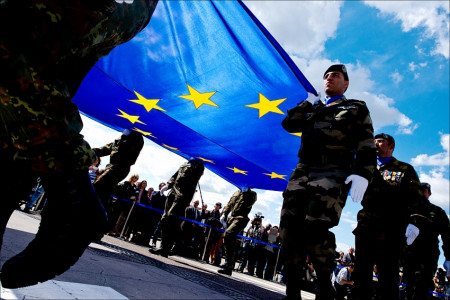
Original by Dmitriy Evstafiev published by Eurasia Expert, translation by J.Hawk
In early May, Western media was leaked information on Germany’s “secret plan” to create a European Army with a unified command and planning structure. The plan is to be revealed by July 2016. Dmitry Evstafiev analyzes the reasons why the “burden of defense” was brought up by the EU at this particular time, and whether we should expect the appearance of a pan-European army.
The refugee crisis and the general deterioration of the military and political situation in the EU’s immediate periphery brought the need to establish a force structure operating in the EU’s interests back on the agenda. To perform missions which are formally outside the “NATO mandate” framework, no matter how fluid that term is.
There were two post-Soviet attempts to form something resembling a military force within the European political structures:
–The second half of the 1990s, when the “European Defense Identity” was being discussed as a continuation of the half-forgotten West European Union (WEU).
–The first half of the ’00s, when the European Defense Agency was formed in 2004, and NATO took over the Afghanistan coalition command from the US in August 2006, and implemented its independently developed operational plan for controlling the country’s southern provinces.
Both of them came to nothing. Mainly because the Europeans, at both the elite and mass level, did not perceive threads or missions that would have to performed by institutions other than NATO.
Sure, the refugee crisis and the increase in the terrorist threat created a new sense of vulnerability among the European elites, particularly the “Old Europe” ones, after 25 years of enjoying not being “frontline states.” There is now awareness that Europe cannot isolate itself politically from violent transformations in seemingly remote regions. But is that enough to overcome the traditional “brakes” on EU’s military potential? Which include:
–The conflict between national and European interests. Even during the height of “Euro-optimism”, EU’s national governments were not prepared to turn over the matters of defense to the European bureaucracy. Which is why the EDA is still a “second-tier structure” which often spends years on end without a director.
–Limited military assets. Only France and the UK (which were never enthusiastic about EU’s defense identity) can boast having a genuine military potential and experience in using it in combat during the last three decades.
–Fear of internal EU power balance changes. Should an EU army or at least its command structures appear, Germany will not be able to dominate other countries as openly, but rather have to negotiate and not only with France but also, for example, Poland.
There was also US opposition, but even without it the odds of a genuine EU defense identity were small.
In actuality, the “demand corridor” for EU’s common defense strategy was always narrow: it ranged between dealing with low intensity threats such as sporadic terrorism, migration, and trans-national organized crime on the one hand, and local interventions in countries outside NATO’s “sphere of responsibility” when the US does not want to get involved.
From an objective perspective, the threat spectrum faced by the EU does not require any specialized command and staff infrastructure.
Even such relatively large-scale tasks as the Libya intervention to support one side in a civil war can be accomplished using existing military forces and coordinating capacities. Which is what is taking place.
Europe does not have either military assets or political will to pursue genuine power politics. Instead there is enormous bureaucratization which can cripple any, even the most urgent, project.
On the other hand, it would be wrong to think that the renewed discussion of a European defense potential are nothing more than bluff. Their renewal or, at a minimum, the attempt to renew the discussion concerning the European Army reflects ongoing political processes in Europe. They include:
–European elites’ realization of the need to react to the mass perception of growing security threats which is resulting in perfectly understandable political outcomes. For that reason, there needs to exist at least a “plan.” The main question here is the extent to which Berlin decided to use the “Russian military threat” bogey to motivate the creation of the European Army, as opposed to limiting itself to the problem of terrorism. The first option appears attractive to Merkel from the point of view of German politics.
–The need for a high-profile political success to offset the EU’s loss of economic independence at the TTIP negotiations with the US. These new defense ideas were not leaked at the height of the refugee crisis or right after the Brussels terrorist attacks, but after revelations of the rigged nature of the proposed agreement which nobody doubts will ultimately be signed. The European citizen is therefore being offered something akin to “moral compensation.”
–The Germans’ clear desire to revive Berlin’s somewhat waned leadership in European processes. Germany is probably assuming that in the current political situation in Europe the question of a unified defensive system will inevitably arise, so therefore it would not be prudent to leave it to challengers to the role of European leadership. Such as the post-Hollande France.
Therefore the new and yet to be revealed “military” proposals probably will not yield any increase in the EU’s military potential.
These initiatives should instead be viewed as an effort to resolve internal conflicts within the EU. Nevertheless, the ensuing discussion will be interesting to follow. In particular, the degree to which the European elites are prepared to discuss the “defense burden.” An analysis of these debates will help us answer a very important question: can Europe preserve even a modicum of global military and political competitiveness? The processes of EU-level coordination of counter-terrorism and low-intensity threat responses are also of interest. In both cases, the situation demands serious political decisions.




Hollande is going soon, and Merkel will quickly follow suit. I am not holding my breath over this soon stillborn contraption…